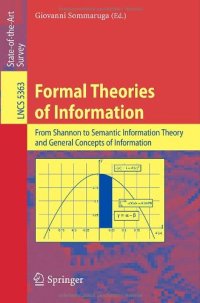
Ebook: Formal Theories of Information: From Shannon to Semantic Information Theory and General Concepts of Information
- Tags: Coding and Information Theory, Mathematical Logic and Formal Languages, Discrete Mathematics in Computer Science, Theory of Computation, Mathematical Logic and Foundations
- Series: Lecture Notes in Computer Science 5363 : Theoretical Computer Science and General Issues
- Year: 2009
- Publisher: Springer-Verlag Berlin Heidelberg
- City: Berlin ; New York
- Edition: 1
- Language: English
- pdf
This book presents the scientific outcome of a joint effort of the computer science departments of the universities of Berne, Fribourg and Neuchâtel.
Within an initiative devoted to "Information and Knowledge", these research groups collaborated over several years on issues of logic, probability, inference, and deduction. The goal of this volume is to examine whether there is any common ground between the different approaches to the concept of information.
The structure of this book could be represented by a circular model, with an innermost syntactical circle, comprising statistical and algorithmic approaches; a second, larger circle, the semantical one, in which "meaning" enters the stage; and finally an outermost circle, the pragmatic one, casting light on real-life logical reasoning.
These articles are complemented by two philosophical contributions exploring the wide conceptual field as well as taking stock of the articles on the various formal theories of information.
This book presents the scientific outcome of a joint effort of the computer science departments of the universities of Berne, Fribourg and Neuchâtel. Within an initiative devoted to 'Information and Knowledge ', these research groups collaborated over several years on issues of logic, probability, inference, and deduction. The goal of this volume is to examine whether there is any common ground between the different approaches to the concept of information. The structure of this book could be represented by a circular model, with an innermost syntactical circle, comprising statistical and algorithmic approaches; a second, larger circle, the semantical one, in which 'meaning ' enters the stage; and finally an outermost circle, the pragmatic one, casting light on real-life logical reasoning. These articles are complemented by two philosophical contributions exploring the wide conceptual field as well as taking stock of the articles on the various formal theories of information